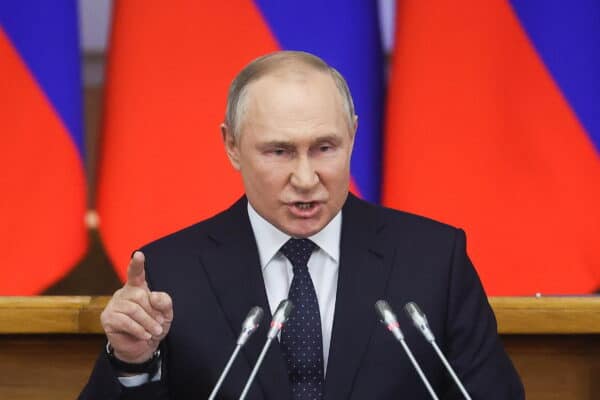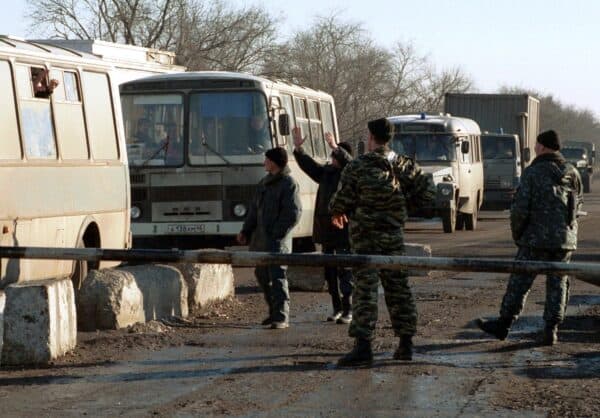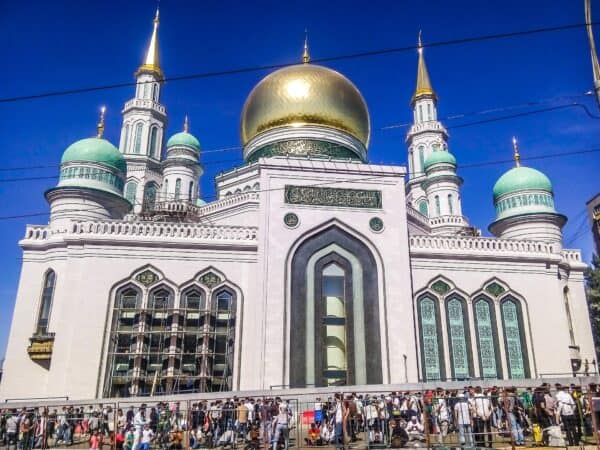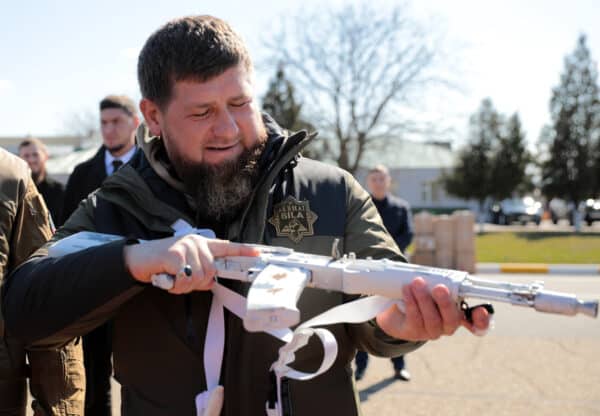What Are We to Make of Vladimir Putin?
- Post AuthorBy Yaroslav Lavrentievich Podvolotskiy
- Post DateMon May 02 2022
April 27, 2022, St. Petersburg, Russia: President Vladimir Putin addresses a meeting of the Council of Legislators under the Russian Federal Assembly at the Tauride Palace. (Credit Image: © Alexander Demianchuk / TASS via ZUMA Press)
Many white advocates believe President Vladimir Putin is a kindred spirit on a crusade against the liberal Western establishment and Islam. But an analysis of his record shows that he is no friend of the interests of whites.
However, Russia’s president deserves credit where it is due. When Mr. Putin came to power in 1999, Russia was in shambles. Unscrupulous businessmen were looting the country. Working-class Russians were hard hit by acting prime minister Yegor Gaidar’s 1992–1993 “shock therapy” economic reforms. They suffered from high unemployment as state enterprises closed. Many died deaths of despair not unlike American working-class whites, while others turned to organized crime to make ends meet. In the Caucasus, the Chechens were rebelling for the second time in 10 years. They were on the verge of independence after having ethnically cleansed Chechnya of Russians and Ukrainians in the first half of the 1990s.
Mr. Putin tackled all these problems. In late summer 1999, as prime minister, he declared Chechnya’s president Aslan Maskhadov illegitimate and launched an invasion. By next May, Russia had established federal control over Chechnya, and the Chechen rebels had been routed. After Mr. Putin became president, he jailed or exiled kleptocrat oligarchs, notably Boris Berezovsky, Vladimir Gusinsky, and Mikhail Khodorkovsky.
Dec. 11, 1999 – Russian soldiers greet their colleagues returning from Chechnya at Ingush-Chechen border near the village Sleptsovskaya. (Credit Image: © PHOTOGNOSOURCE / TNS / ZUMAPRESS.com)
Throughout the 2000s, President Putin and his administration took advantage of the commodities boom to expand industry and production. The period of economic growth from 2000 to recently resulted in higher incomes and economic prosperity. Murder and suicide declined.
However, President Putin has failed in important ways. He has been unable to increase the white birth rate, his country is a magnet for Central Asian immigrants, and he has let Ramzan Kadyrov govern Chechnya lawlessly.
The demographic outlook is horrible. Russia’s fertility rate is 1.8, and it is doubtful it will ever rise above 2.1. Russia’s death rate is 12.9 per thousand, while its birth rate is 11.6. The UN projects Russia’s population to fall by 20 million by the end of the century. At the same time, Russia’s overclass is importing millions of unassimilable immigrants.
In 2019, the largest number of foreign residents in Russia — 2 million — were from Uzbekistan. Immigrants from other Central Asian and Caucasus countries, such as Tajikistan, Kyrgyzstan, and Azerbaijan number in the millions. Meanwhile, the immigration from white Christian nations in the Commonwealth of Independent States, such as Ukraine and Moldova, or from European Union countries such as Germany and Finland, is declining. The only white nations contributing even slightly to Russia’s falling population are Belarus and France.
Many immigrant Muslims have gone to Moscow. The World Population Review, citing Russia’s 2010 census, stated that Muslims account for 14 percent of the city’s population. The figure has surely grown since then.
The Moscow Cathedral Mosque. (Credit Image: Maqivi via Wikimedia)
Immigration is also transforming Russia’s countryside. Villages are dying as young people leave for cities searching for work. Immigrants from Central Asia are replacing young Russians and dying pensioners. They undercut native wages and take the few jobs remaining at sawmills and on farms.
We hear the same line as in the United States: “Immigrants do jobs Russians won’t” and “Russians are lazy.” This wasn’t the case 30 years ago when Russians staffed collective farms.
No matter where Muslims go in Russia, they cause the same problems. They grope women on the metro, fight with locals, are loud and obnoxious, and some are terrorists. What does President Putin say about this? “Other ethnicities living on the territory of Russia are closer to us than anyone who lives outside of the country.” Tajiks are “closer” than Germans or Poles?
No ordinary Russian believes this. Four-fifths want illegal migrants kicked out. Pensioners see things more clearly than the president. One said of his village, “In 10 years, the village will either disappear or become foreign.” This will all have happened under President Putin.
Muslims in power are even worse, notably Ramzan Kadyrov, whom President Putin put in control of Chechnya. Russian politician Ilya Yashin has detailed Mr. Kadyrov’s criminality in his report titled A Threat to National Security. Mr. Yashin’s research is very detailed and well-written, and I recommend reading it.
Head of Chechnya Ramzan Kadyrov visits an exhibition of equipment designed for use in the Arctic environments. (Credit Image: © Yelena Afonina / TASS via ZUMA Press)
Mr. Kadyrov has stolen millions to build private houses, collect cars, and throw lavish parties. When asked where the money comes from, he said his wealth is a blessing from God. In an interview, when a reporter challenged that, he cynically replied, “Prove it did not come from God.” President Putin has done nothing.
Likewise, in 2015, Russian police from Stavropol, near Georgia, shot and killed a Chechen fugitive who resisted arrest. Mr. Kadyrov responded by telling Chechen security forces to kill any Russian policeman who sets foot in Chechnya. Under the Russian criminal code, that statement is a crime. President Putin did nothing.
That same year, Judge Natalya Perchenko in Yuzhno-Sakhalinsk (on Sakhalin Island) ruled that the Muslim book “Prayer to Allah” was extremist literature. Mr. Kadyrov called her a “devil” and demanded she and others be punished. “If they are not handled in a proper legal way,” he said, “I will personally call them to account, because there is nothing in this life above the Koran for me.” This time President Putin did something. He introduced an amendment to The Law on Countermeasures Against Extremism that makes it a crime to check religious texts for extremism. If you conclude that a call to the faithful to wage war on non-believers is “extremist,” you have theoretically broken the law.
It is doubtful that any other Russian politician could have gotten away with threatening a public official as Mr. Kadyrov did with Judge Perchenko. Mr. Yashin cited the case of Yuriy Bogomolov of the Ryazan branch of the RPR-Parnas party, who referred to judges who fined him as people without honor. He was prosecuted.
What could President Putin could have done differently? He should not have let millions of Central Asian Muslims move in and displace locals from their villages. They could have easily been deported. In 2006, Russia responded to Georgia’s arrest of four of its officers by rounding up thousands of Georgians and deporting them over a two month period.
Mr. Putin could have imposed tariffs on imports to protect Russian industry, bringing it back to its pre-1991 levels. Deporting economic migrants and boosting domestic industry would have resulted in better paying jobs that make it easier to support families.
Finally, President Putin’s 200,000 troops invading Ukraine would have been better used subduing Chechnya once and for all.
These things were possible early in President Putin’s career, when he had the popular support to do them. Russians would have heartily supported pro-family economic policies, expulsion of Muslims, and the prospect of Mr. Kadyrov rotting in the Black Dolphin Prison. Now, it’s too late, because Mr. Putin is in the twilight of his career. Like so many white leaders, he squandered the chance to make long-lasting beneficial changes for his country and people.
2022 isn’t even half over, but I nominate President Vladimir Vladimirovich Putin for White Renegade of the Year.



